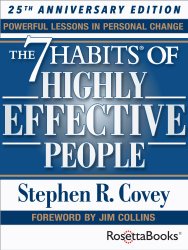 There is no force as powerful as the power of an idea whose time has come.
There is no force as powerful as the power of an idea whose time has come.
What is the difference between those who are successful and those who are not? Why do mid-life crises exist? Why are people so damn miserable all the time? What’s the point of it all anyway?
There are some hefty questions that are being asked here, things we all need to consider. I have been wrestling with these questions for a while now, and had some incomplete answers on which I took for truth for a long time. I had a vague idea of what I had in mind with my life. I wanted to be a successful writer. Just too bad I had only the broadest outlines of what ‘successful’ meant, same goes for the meaning of ‘writer’ and even ‘wanted’. I needed a guide. I needed direction. I needed The Seven Habits of Highly Effective People, I just didn’t know it yet.
Read it again, you are a different person now
To be frank, I skimmed through the book a few years ago, and found it marginally useful. My copy was lying around gathering dust but never really disappeared from my field of reference. Upon the chance insistence of a friend, I got a hold of the audio book version of the book. He said it was helping him, and I could see some positive changes in his life. He was achieving goals that had been eluding me for some time.
The moment the narration started, I knew that this was what I’ve been looking for. I fit the audiobook into any little space I could make for myself. The car on the way to work, quiet moments when cooking or waiting for something to happen, all became little opportunities for tuition into the content of Habits.
Which one are you?
I’ll come right out and say it: there are two types of people in this world – those who have yet to read this book and those who have and have benefitted, even if it’s the audiobook. The sales figures of the material itself should speak volumes to the universality of the life lessons within.
What makes it so good?
The Habits are at the same time easy to understand and comprehensive. It is the only guidebook required to lead an effective life. It espouses an inside out approach to change and provides a road map for implementation whilst simultaneously allowing for your own personal needs and creativity to tailor the content to your needs. The first half focusses on the individual, and the second on that individual in the society at large.
This is not really the same self-help as you’re used to
Self-help has gotten a bit of a bad rap in the past due to the focus on quick fixes and hollow positive attitude techniques, which is deleterious in the long run, which many who have experienced the results of such techniques would tell you. But Habits is nowhere in that ballpark. There are no quick fixes here, no psyche up talk of “You can DO it”, just resonant truth about the human creature as discovered by generations of philosophers and psychologists distilled by Stephen Covey. In fact, he insists on not claiming credit for “discovering” the habits, but stated that he merely wrote them down.
What you think is, is
What it all boils down to is becoming aware of the unique human endowment of conscience, and realizing that between any stimulus and response, there is a space. In this space, a conscious being has the opportunity to choose their response. In that choice resides all of human power and happiness. From that framework, Covey extrapolates the seven things each person needs to do to be a happy, fulfilled creature, drawing strength from a self-created set of principals based on natural law, instead of from the often disappointing reality of life with other people and frail materialism. This is a map of the territory of the self, and promises an upward spiral of effectiveness for all who are willing to take these lessons to heart.
The book is actually universal, in spite of the author’s frame of reference
If I have any criticism of the work, it is that Covey chose to involve religion into the mix. He does admit that these principles ring true for all the major religions out there, but chose to use his frame of reference from time to time. The fact is, that these habits are universal for all humankind, not simply for a select grouping of people who read the same book (other than Habits). Covey espouses to have use the field of reference of regional religions when presenting this book to diverse cultures, thus eliminating, in my opinion, the need for mentioning any single religion at all. I fear that some might misjudge Habits due to that content, and thus lose the benefit that would have been gained if said person could have overlooked it (Choose your response, remember).
Cornerstone of your business
I recommend this book as a starting point for any person who desires more from life. Before you read any other books on the craft or marketing of your books, read this one, it will create baseline organization for you upon which your entire business can be built. I consider this book the cornerstone to success in any endeavor.
Pingback: Affiliates in your Fiction Writing Business()